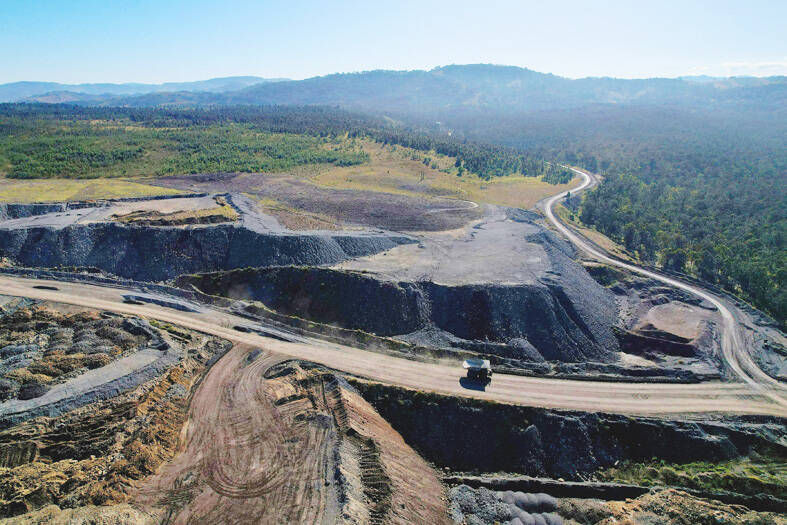Australia is planning to cap coal and gas prices for a year in a bid to shave utility bills for households and businesses hit by soaring costs because of Russia’s invasion of Ukraine, Australian Prime Minister Anthony Albanese said yesterday.
Gas prices would be capped at A$12 (US$8.11 dollar) per gigajoule, while the limit for coal would be A$125 per tonne for 12 months, with the Australian government supporting coal producers whose costs exceed that figure, he said.
“Extraordinary times call for extraordinary measures, and we know, with the Russian invasion of Ukraine, what we’ve seen is a massive increase in global energy prices,” Albanese told reporters after a Cabinet meeting that included state leaders.

Photo: Reuters
The government also agreed to provide assistance of up to A$1.5 billion to homes and small businesses, starting from the second quarter of next year.
The gas price cap would apply to new wholesale gas sales by producers on Australia’s east coast.
At A$12, it is less than half the average short term gas price of A$26 per gigajoule in the third quarter of this year, data from research group EnergyQuest showed.
The coal price cap would apply to coal used in power generation, the government said.
The cap of A$125 is about half the A$249 a tonne average selling price Banpu PCL achieved for its Australian coal in the third quarter.
Gas producers had urged the government not to impose the price cap, saying it would deter future investment in supply, which would be key to driving down prices in the long term, and could damage Australia’s reputation for foreign investors.
Producers that could be hit by the gas price cap include ExxonMobil Corp, Shell PLC, Origin Energy Ltd, Woodside Energy Group, Santos Ltd and South Korean steel giant POSCO International Corp’s Senex Energy.
“The uncertainty caused by the federal government’s plan to impose a price cap in the eastern Australian gas market has already destroyed the confidence both buyers and sellers need in order to complete the transactions that will ensure energy supplies to households and businesses,” a Woodside spokesperson said.
Coal producers that would be affected include Glencore PLC, Banpu Resources Australia, Coronado Global Resources Inc and Peabody Corp, which supply coal to power plants in New South Wales and Queensland states.
Coal producers declined to comment until they see further details on how the price cap would work.
The Australian Industry Group welcomed the price caps, but said they were not the best solution.
“They will be messy to implement ... but they look likely to be very helpful in dampening the immediate economic pain of this global energy crisis,” group CEO Innes Willox said in a statement.
However, power producers, represented by the Australian Energy Council, said it was unclear whether electricity bills will fall anytime soon, because energy retailers and generators that hedge their risks have already settled their contracts for the next 12 months on the basis of higher prices.
“If more lower priced fuel is available, over time those savings may lead to lower wholesale electricity prices, but that will take time to flow through to end users,” council chief executive Sarah McNamara said in a statement.

Nvidia Corp chief executive officer Jensen Huang (黃仁勳) on Monday introduced the company’s latest supercomputer platform, featuring six new chips made by Taiwan Semiconductor Manufacturing Co (TSMC, 台積電), saying that it is now “in full production.” “If Vera Rubin is going to be in time for this year, it must be in production by now, and so, today I can tell you that Vera Rubin is in full production,” Huang said during his keynote speech at CES in Las Vegas. The rollout of six concurrent chips for Vera Rubin — the company’s next-generation artificial intelligence (AI) computing platform — marks a strategic

REVENUE PERFORMANCE: Cloud and network products, and electronic components saw strong increases, while smart consumer electronics and computing products fell Hon Hai Precision Industry Co (鴻海精密) yesterday posted 26.51 percent quarterly growth in revenue for last quarter to NT$2.6 trillion (US$82.44 billion), the strongest on record for the period and above expectations, but the company forecast a slight revenue dip this quarter due to seasonal factors. On an annual basis, revenue last quarter grew 22.07 percent, the company said. Analysts on average estimated about NT$2.4 trillion increase. Hon Hai, which assembles servers for Nvidia Corp and iPhones for Apple Inc, is expanding its capacity in the US, adding artificial intelligence (AI) server production in Wisconsin and Texas, where it operates established campuses. This

Garment maker Makalot Industrial Co (聚陽) yesterday reported lower-than-expected fourth-quarter revenue of NT$7.93 billion (US$251.44 million), down 9.48 percent from NT$8.76 billion a year earlier. On a quarterly basis, revenue fell 10.83 percent from NT$8.89 billion, company data showed. The figure was also lower than market expectations of NT$8.05 billion, according to data compiled by Yuanta Securities Investment and Consulting Co (元大投顧), which had projected NT$8.22 billion. Makalot’s revenue this quarter would likely increase by a mid-teens percentage as the industry is entering its high season, Yuanta said. Overall, Makalot’s revenue last year totaled NT$34.43 billion, down 3.08 percent from its record NT$35.52

PRECEDENTED TIMES: In news that surely does not shock, AI and tech exports drove a banner for exports last year as Taiwan’s economic growth experienced a flood tide Taiwan’s exports delivered a blockbuster finish to last year with last month’s shipments rising at the second-highest pace on record as demand for artificial intelligence (AI) hardware and advanced computing remained strong, the Ministry of Finance said yesterday. Exports surged 43.4 percent from a year earlier to US$62.48 billion last month, extending growth to 26 consecutive months. Imports climbed 14.9 percent to US$43.04 billion, the second-highest monthly level historically, resulting in a trade surplus of US$19.43 billion — more than double that of the year before. Department of Statistics Director-General Beatrice Tsai (蔡美娜) described the performance as “surprisingly outstanding,” forecasting export growth